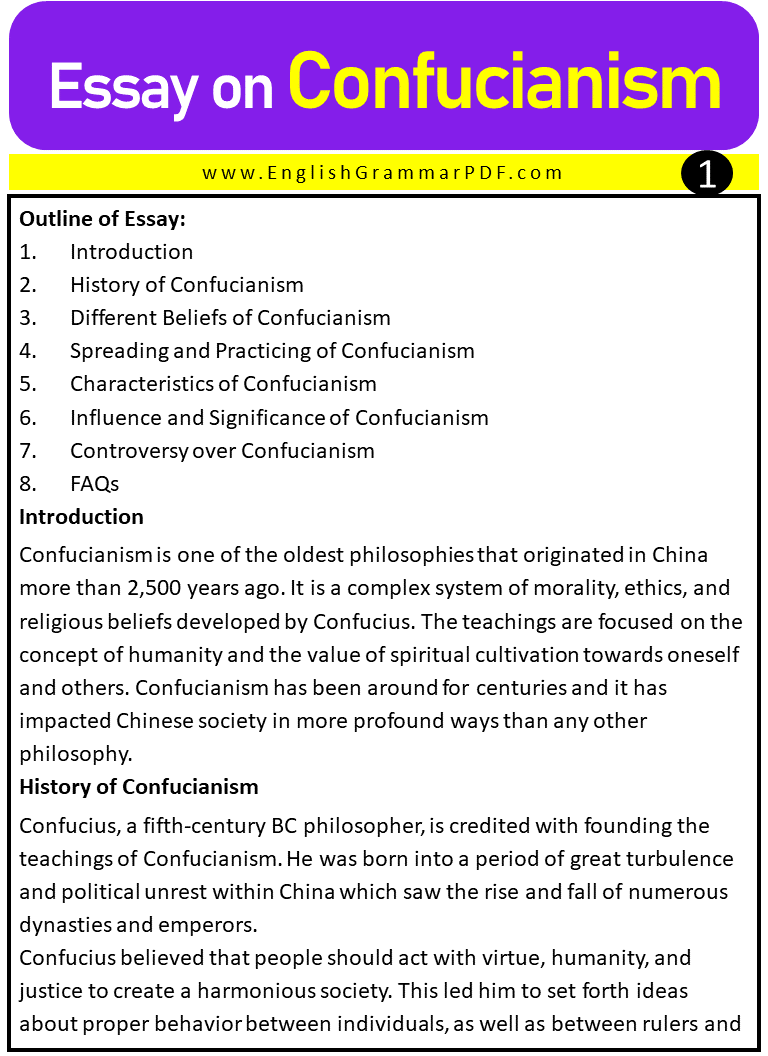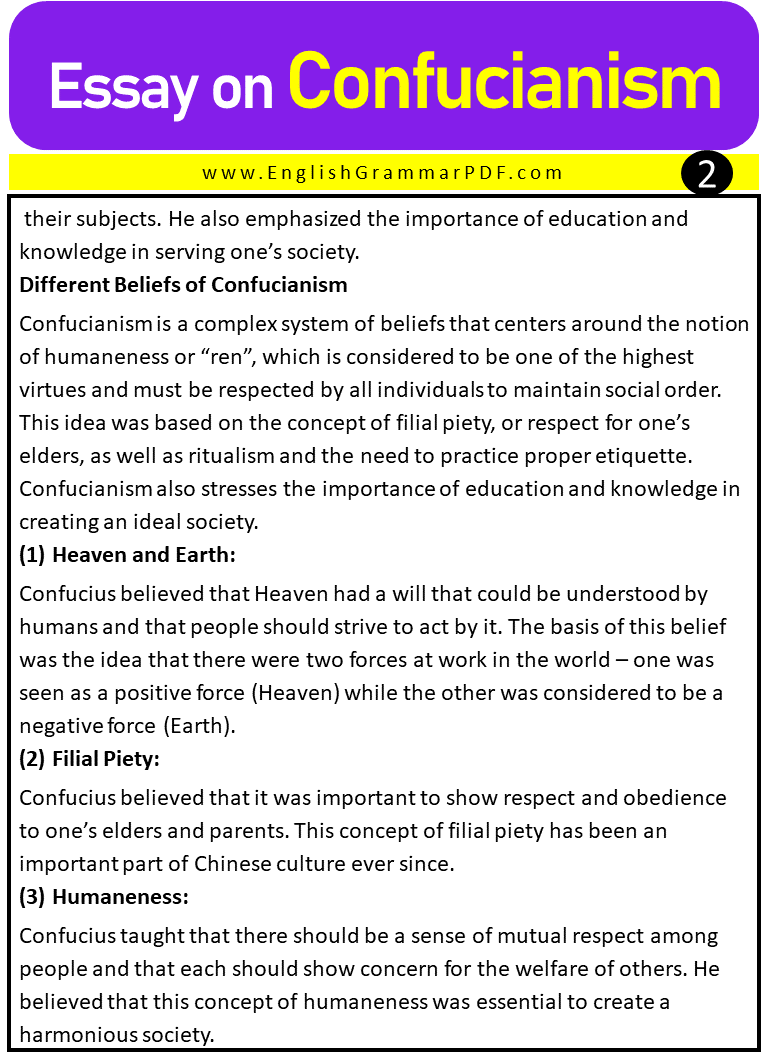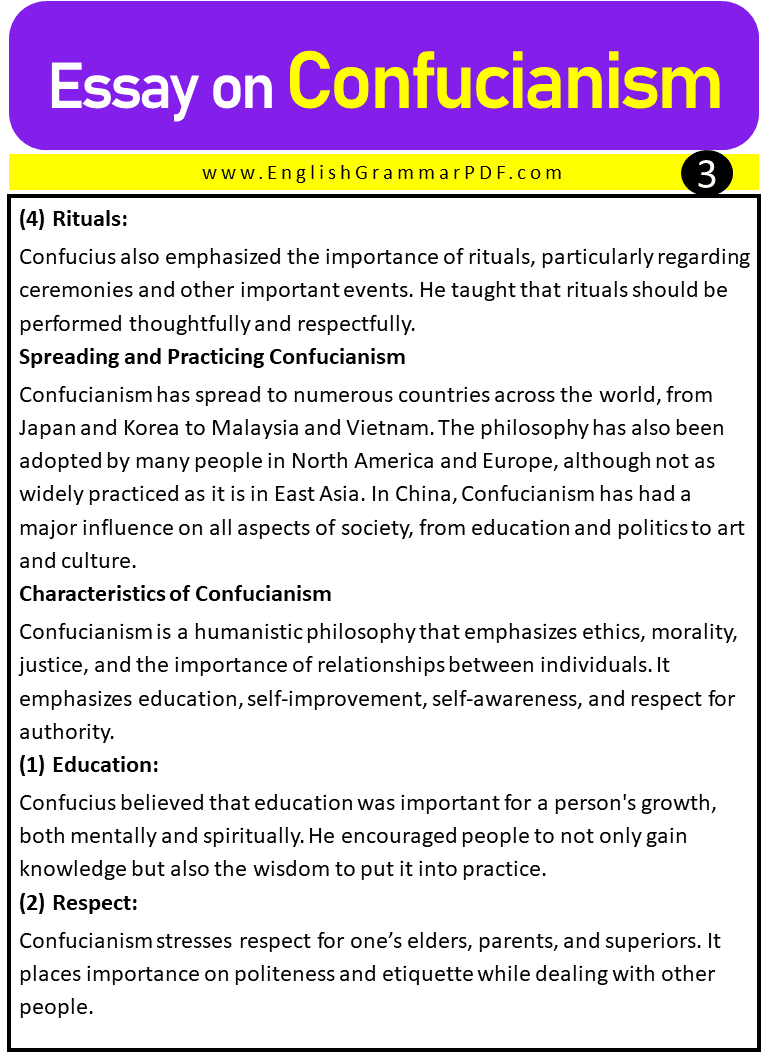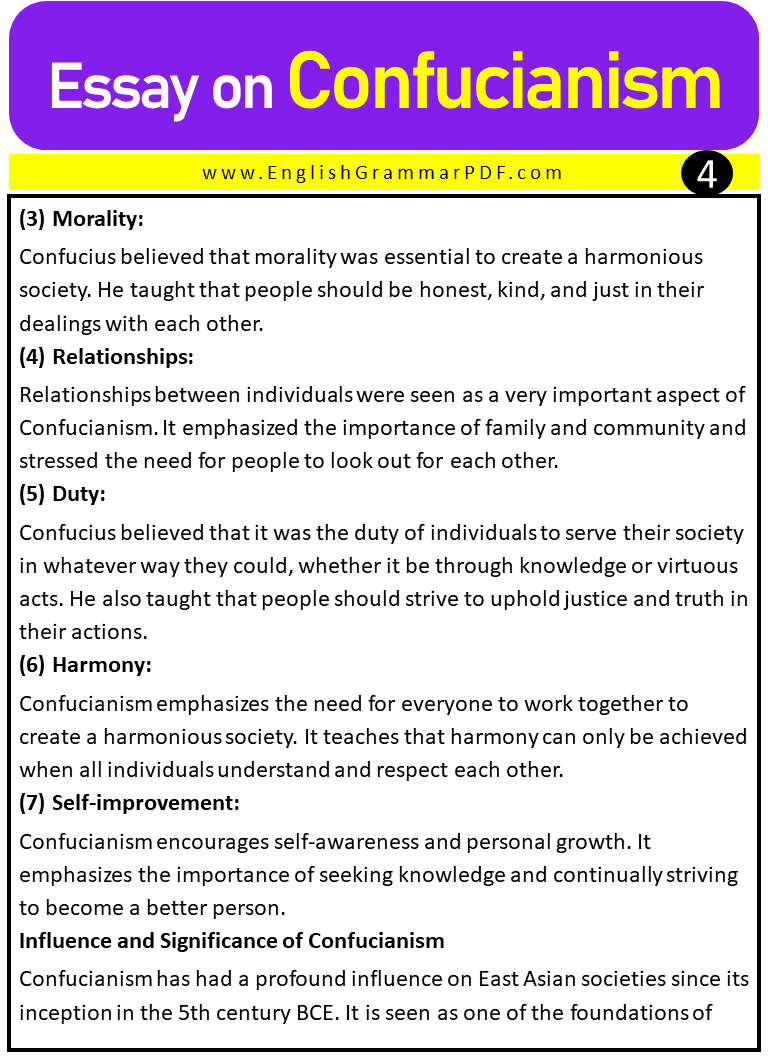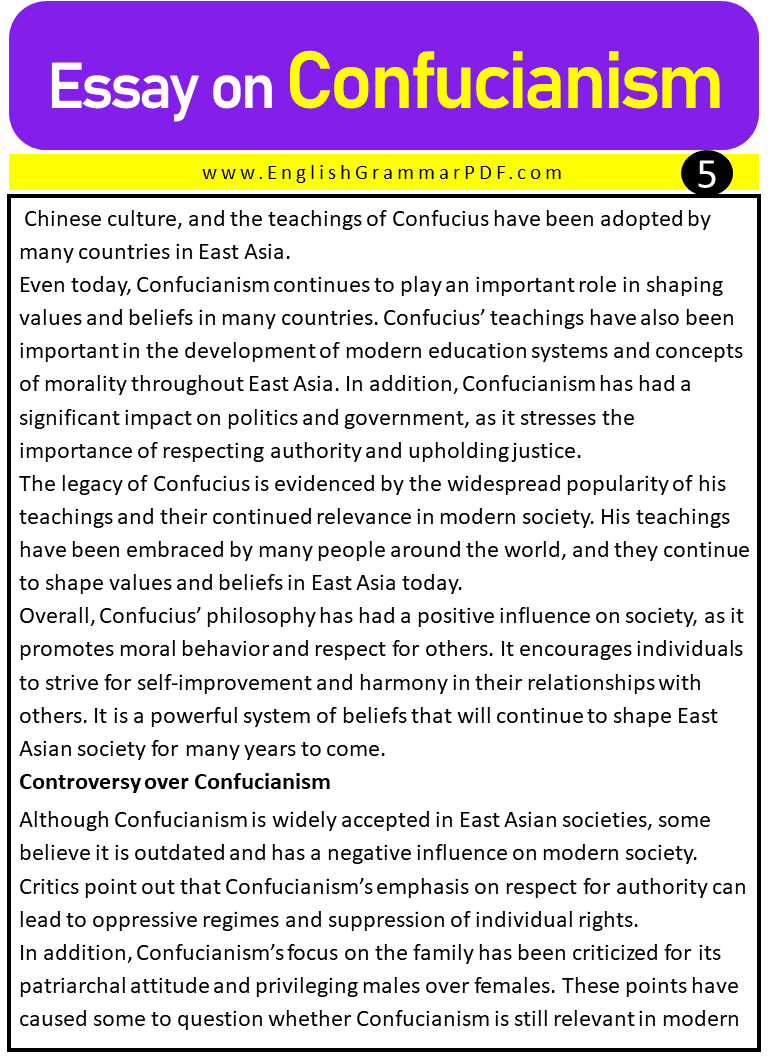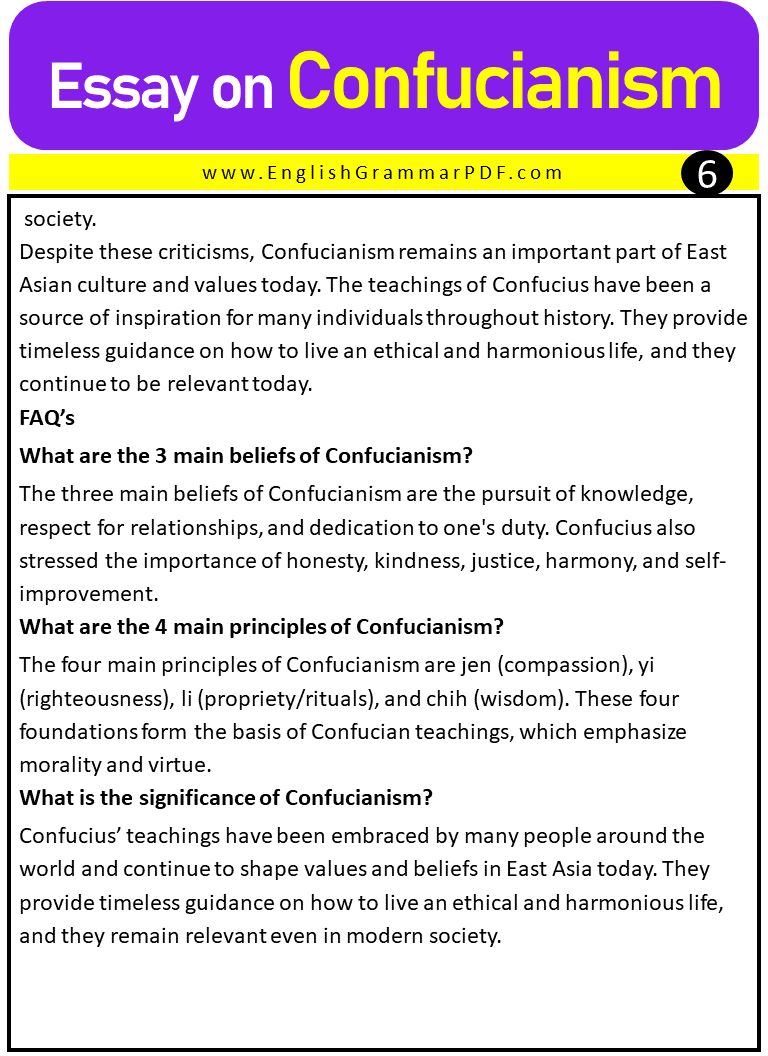Essay On Confucianism
Outline of Essay:
- Introduction
- History of Confucianism
- Different Beliefs of Confucianism
- Spreading and Practicing of Confucianism
- Characteristics of Confucianism
- Influence and Significance of Confucianism
- Controversy over Confucianism
- FAQs
Discover More:
Introduction
Confucianism is one of the oldest philosophies that originated in China more than 2,500 years ago. It is a complex system of morality, ethics, and religious beliefs developed by Confucius. The teachings are focused on the concept of humanity and the value of spiritual cultivation towards oneself and others. Confucianism has been around for centuries and it has impacted Chinese society in more profound ways than any other philosophy.
History of Confucianism
Confucius, a fifth-century BC philosopher, is credited with founding the teachings of Confucianism. He was born into a period of great turbulence and political unrest within China which saw the rise and fall of numerous dynasties and emperors.
Confucius believed that people should act with virtue, humanity, and justice to create a harmonious society. This led him to set forth ideas about proper behavior between individuals, as well as between rulers and their subjects. He also emphasized the importance of education and knowledge in serving one’s society.
Different Beliefs of Confucianism
Confucianism is a complex system of beliefs that centers around the notion of humaneness or “ren”, which is considered to be one of the highest virtues and must be respected by all individuals to maintain social order.
This idea was based on the concept of filial piety, or respect for one’s elders, as well as ritualism and the need to practice proper etiquette. Confucianism also stresses the importance of education and knowledge in creating an ideal society.
(1) Heaven and Earth:
Confucius believed that Heaven had a will that could be understood by humans and that people should strive to act by it. The basis of this belief was the idea that there were two forces at work in the world – one was seen as a positive force (Heaven) while the other was considered to be a negative force (Earth).
(2) Filial Piety:
Confucius believed that it was important to show respect and obedience to one’s elders and parents. This concept of filial piety has been an important part of Chinese culture ever since.
(3) Humaneness:
Confucius taught that there should be a sense of mutual respect among people and that each should show concern for the welfare of others. He believed that this concept of humaneness was essential to create a harmonious society.
(4) Rituals:
Confucius also emphasized the importance of rituals, particularly regarding ceremonies and other important events. He taught that rituals should be performed thoughtfully and respectfully.
Spreading and Practicing Confucianism
Confucianism has spread to numerous countries across the world, from Japan and Korea to Malaysia and Vietnam. The philosophy has also been adopted by many people in North America and Europe, although not as widely practiced as it is in East Asia. In China, Confucianism has had a major influence on all aspects of society, from education and politics to art and culture.
Characteristics of Confucianism
Confucianism is a humanistic philosophy that emphasizes ethics, morality, justice, and the importance of relationships between individuals. It emphasizes education, self-improvement, self-awareness, and respect for authority.
(1) Education:
Confucius believed that education was important for a person’s growth, both mentally and spiritually. He encouraged people to not only gain knowledge but also the wisdom to put it into practice.
(2) Respect:
Confucianism stresses respect for one’s elders, parents, and superiors. It places importance on politeness and etiquette while dealing with other people.
(3) Morality:
Confucius believed that morality was essential to create a harmonious society. He taught that people should be honest, kind, and just in their dealings with each other.
(4) Relationships:
Relationships between individuals were seen as a very important aspect of Confucianism. It emphasized the importance of family and community and stressed the need for people to look out for each other.
(5) Duty:
Confucius believed that it was the duty of individuals to serve their society in whatever way they could, whether it be through knowledge or virtuous acts. He also taught that people should strive to uphold justice and truth in their actions.
(6) Harmony:
Confucianism emphasizes the need for everyone to work together to create a harmonious society. It teaches that harmony can only be achieved when all individuals understand and respect each other.
(7) Self-improvement:
Confucianism encourages self-awareness and personal growth. It emphasizes the importance of seeking knowledge and continually striving to become a better person.
Influence and Significance of Confucianism
Confucianism has had a profound influence on East Asian societies since its inception in the 5th century BCE. It is seen as one of the foundations of Chinese culture, and the teachings of Confucius have been adopted by many countries in East Asia.
Even today, Confucianism continues to play an important role in shaping values and beliefs in many countries. Confucius’ teachings have also been important in the development of modern education systems and concepts of morality throughout East Asia. In addition, Confucianism has had a significant impact on politics and government, as it stresses the importance of respecting authority and upholding justice.
The legacy of Confucius is evidenced by the widespread popularity of his teachings and their continued relevance in modern society. His teachings have been embraced by many people around the world, and they continue to shape values and beliefs in East Asia today.
Overall, Confucius’ philosophy has had a positive influence on society, as it promotes moral behavior and respect for others. It encourages individuals to strive for self-improvement and harmony in their relationships with others. It is a powerful system of beliefs that will continue to shape East Asian society for many years to come.
Controversy over Confucianism
Although Confucianism is widely accepted in East Asian societies, some believe it is outdated and has a negative influence on modern society. Critics point out that Confucianism’s emphasis on respect for authority can lead to oppressive regimes and suppression of individual rights.
In addition, Confucianism’s focus on the family has been criticized for its patriarchal attitude and privileging males over females. These points have caused some to question whether Confucianism is still relevant in modern society.
Despite these criticisms, Confucianism remains an important part of East Asian culture and values today. The teachings of Confucius have been a source of inspiration for many individuals throughout history. They provide timeless guidance on how to live an ethical and harmonious life, and they continue to be relevant today.
FAQ’s
What are the 3 main beliefs of Confucianism?
The three main beliefs of Confucianism are the pursuit of knowledge, respect for relationships, and dedication to one’s duty. Confucius also stressed the importance of honesty, kindness, justice, harmony, and self-improvement.
What are the 4 main principles of Confucianism?
The four main principles of Confucianism are jen (compassion), yi (righteousness), li (propriety/rituals), and chih (wisdom). These four foundations form the basis of Confucian teachings, which emphasize morality and virtue.
What is the significance of Confucianism?
Confucius’ teachings have been embraced by many people around the world and continue to shape values and beliefs in East Asia today. They provide timeless guidance on how to live an ethical and harmonious life, and they remain relevant even in modern society.
What were the Confucianism practices?
Confucianism is known for its emphasis on ritual and etiquette. The practice of ritual includes honoring ancestors, paying respect to elders, and demonstrating politeness in all forms of communication. Confucians also emphasize proper behavior between family members and friends, as well as the importance of education.
is Confucianism a religion?
No, Confucianism is not classified as a religion. It is a philosophical system that focuses on morality and virtue rather than belief in deities or the supernatural. However, some scholars have argued that Confucianism has certain elements of spirituality and faith.
What are the five virtues of Confucianism?
The five virtues of Confucianism are righteousness, propriety, wisdom, integrity, and compassion. These values are seen as the foundation for leading an ethical and virtuous life. Confucius believed that a moral person could create a peaceful society, free from conflict and strife.
How did Confucianism spread?
Confucianism spread primarily through the teachings of Confucius and his disciples. Over time, Confucianism grew in popularity and influence and eventually became an official philosophy of China during the Han Dynasty. After this, it spread throughout East Asia, where it remains a major part of culture today.
Download PDF of Essay On Confucianism

